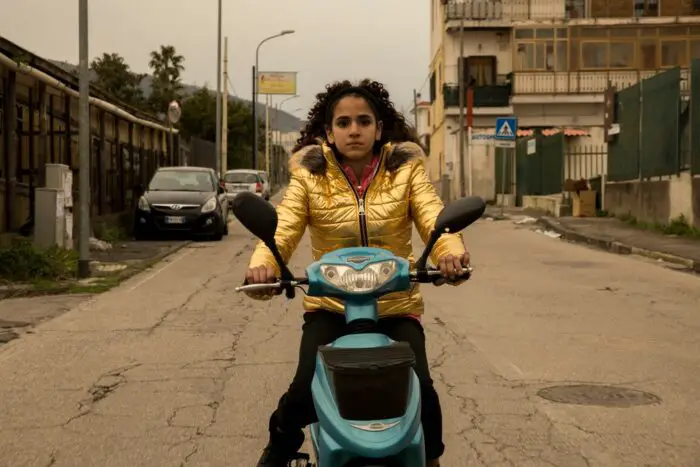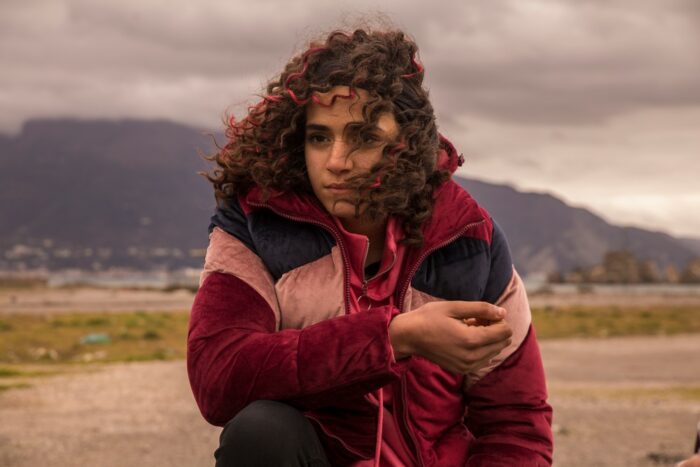The cinema verité-style coming-of-age drama Californie is so naturalistic and arresting one might be forgiven for assuming it a documentary. And that is clearly the intent of documentarians Alessandro Cassigoli and Casey Kauffman, whose narrative feature drama was over five years in the making. A festival hit on its original 2021 run, winning awards at Venice and Tokyo and debuting this week on the North American streaming service Film Movement Plus, Californie distills a young Moroccan émigré girl’s long and often at-risk adolescence into a brief, affecting, and ultimately moving 90 minutes of screen time.
At eleven, scrawny, gangly Jamila (Khadija Jaafari) seems transfixed by a single, if unlikely, passion: she’s a gym rat, hanging out at the local training center, admiring the older girls, working out in hopes of transforming her stick-slender physique into something more powerful. It’s her first stop in the morning, where she often sneaks in a shower and a sports drink before school—neither of which are allowed in her impoverished family home where either would make for an extravagant luxury. And it’s her after-school home, even if her own training is secondary to her older brother’s and Jamila must often forgo her own to attend to chores. At school, Jamila seems bright, well-adjusted, and attentive, despite her family difficulties: immgrants from Morocco, she lives with her mother, sister, and two brothers in Torre Annunziata, on the outskirts of Naples, while her father stays behind to work.
Older sister Angelica (Ikram Jaafari, Khadija’s sister) serves as something of a foil to younger Jamila. While Jamila has only her training and her schoolwork but no friends to speak of, Angelica has made the most of her new life in Italy, integrating into the school scene’s social fabric, making acquaintances and starting to party. Meanwhile, the family’s presence in Italy seems ever more tenuous, and the specter of returning to Morocco looms.
Cassigoli and Kauffman film these opening scenes in Californie with a striking efficiency, moving quickly from scene to scene, gym to classroom to kitchen table and back, charting Jamila’s daily rituals and subtly reinforcing her character traits. The family’s immigrant status isn’t belabored, but subtle moments of discrimination (like Jamila’s convincing French-Moroccan accent at in French class at school) mark her as just different enough from her peers to warrant scorn. The narrative is partitioned out into separate sequences, shot with the same cast at different intervals, each marked by a title card announcing Jamila’s age. At twelve, her life begins to change. Her father still in Morocco, her mother working longer hours, and a taller, fuller, more resistant Jamila—still played by Jaafari—begins to chafe.
No longer training at the gym and now outspoken in her disdain for school, Jamila begins to fight with her classmates. Soon, it becomes easier for her to skip school than attend; she helps out a neighbor who runs a salon service of sorts in her apartment, where her talent makes her something of a valuable commodity. Her typically adolescent impatience has her looking, everywhere, for shortcuts. She poaches her boss’s clients, trades her pay for a motorbike, rejects her family, and begins plotting her escape.

Each new chapter, each new year, in Jamila’s life shown in Californie accelerates her physical growth and developing maturity, even as she remains, at each increment, the same sharp-tongued adolescent girl, frustrated with adults, desirous of flight, looking for a path to an easier life. There’s a charming boy with a broad smile who sells her her bike. And there’s her increasingly successful boss, Jasmine, whose expanded clientele earns her a new shop with individual stations; as time passes and her business grows she becomes increasingly reliant on Jamila’s talents, and what sound on the surface like small favors—for instance, allowing Jamila to sleep on a cot in the basement of her salon to cut down on commuting time—begin to seem increasingly exploitative.
Like a good documentary, what Californie does best is to use the individual case to represent the larger concern. The narrative never loses sight of its protagonist, and Jaafari brings both an adolescent impertinence and an engaging charisma to the role at each year of age depicted: eleven, twelve, thirteen, fourteen, fifteen. But along the way, Cassigoli and Kauffman subtly indicate just how at-risk Jamila’s life, estranged from family, a single step away from unemployment, homelessness, or even trafficking, has become. For a girl like her, whether a Moroccan transplant to Italy or, practically, any immigrant child, the safety net’s gaps are too loose and too wide. Whether she “makes it” or not will depend to some degree on her own industriousness—for which Jamila does not lack—and on the intentions, for good or ill, of others.

Californie’s verité-style approach, a film shot and edited like, say, the documentary Children of the Mist, isn’t going to focus on dramatic speeches or confrontations, and it’s not going to rely on traditional narrative structures. There’s no obvious antagonist and no conclusive denouement. But for the length of its runtime and the full five years of the protagonist’s life it renders, Californie is, like a good number of films released across the world in recent years (the aforementioned Children of the Mist, A Chiara, Tori and Lokita, Marisol, Rodeo, Sister & Sister, Cadejo Blanco, Dry Ground Burning, Tótem, Malta) coming-of-age storytelling at its richest and most naturalistic.
Californie debuts on the North American streaming service Film Movement Plus March 29, 2024.



